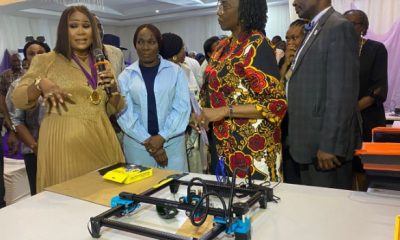Nigerian National School Awards
250 Awards – Nigerian National School Awards 2025

250 Awards – Nigerian National School Awards 2025
250 awards, making it the largest gathering of schools, students, teachers, parents, service providers, individuals and corporate organisation in Nigeria
Meet 500+ exhibitors showcasing the latest in educational materials and technology
Connect with top schools and service providers in one roof
Schools/ Service Providers: – Providing Elementary and Secondary Education, Alternative/Special Education Services, Education Management Organizations, Charter Schools, Virtual Schools, and Proprietary Schools.
Supplemental Education Service Providers: Providing Higher Education, Vocational Education, Learning Centers, Tutoring Services and Assessment Services.
Educational Products & Services Sector: Production and supply of educational material and products including Educational Products, Publishing, and Supplemental Products.
Education Support Services Sector: – Providing support and ancillary services to the education industry including Education Consultants, Education Information and Research, Education Investment Services, Education Policy Specialists, and Technology Services.
Visit – nationalschoolwatch.com
Nigerian National School Awards
Nigerian National School Awards 2025

Nigerian National School Awards 2025
Theme: Empowering Tomorrow’s Leaders: The Crucial Role of Education in National Development
Education.
Education is often identified as the cornerstone of a society’s progress and the key to nurturing the leaders of tomorrow. The education sector indeed plays a vital role in shaping individuals into well-rounded, knowledgeable and skilled individuals who can contribute meaningfully to their communities and nation. From instilling essential academic knowledge to fostering critical thinking, leadership skills and emotional intelligence, education serves as a powerful tool in preparing well-rounded personalities for leadership roles and active participation in the development of their country.
Equipping individuals for a complex world
One of the fundamental aspects of the education system is its role in imparting knowledge and skills that are essential for individuals to succeed in an increasingly complex and interconnected world. Through a well-rounded curriculum that includes subjects ranging from mathematics and science to literature and history, students are equipped with the knowledge necessary to understand the world around them and make informed decisions, besides being empathetic and compassionate towards the less fortunate in society.
Beyond facts and figures: cultivating critical thinkers
Moreover, education goes beyond the mere transmission of facts and figures. It also plays a crucial role in developing critical thinking and problem-solving skills among students. By encouraging students to question, analyse and evaluate information, the education provider helps cultivate independent and creative thinkers who are capable of finding innovative solutions to the dynamic challenges facing society.
Furthermore, education plays a pivotal role in nurturing leadership qualities among individuals. By providing opportunities for students to engage in extracurricular activities, such as student government, hobby clubs, sports, and community service, the education sector helps students develop essential leadership skills such as communication, teamwork, decision-making and conflict resolution. These experiences not only prepare students for leadership roles in the future but also instill in them a sense of responsibility, empathy and ethical values.
Emotional intelligence: the mark of a compassionate leader
In addition to academic and leadership skills, education is also instrumental in fostering emotional intelligence and empathy among individuals. Through social-emotional learning programs, students are taught important skills such as self-awareness, self-regulation, empathy and interpersonal skills. These skills are vital for individuals to navigate relationships, work collaboratively with others and become compassionate and ethical leaders.
Education as a tool for social mobility
Moreover, education serves as a powerful tool for promoting social mobility and reducing inequality within society. By providing all individuals, regardless of their background, with access to quality education, the education sector enables individuals to achieve their full potential and pursue opportunities that were previously out of reach. This, in turn, leads to a more diverse and inclusive leadership that better represents the population it serves.
Conclusion
In conclusion, we can say that the education sector plays a multifaceted and crucial role in building the leaders of tomorrow and preparing them to contribute meaningfully to the nation. Through its emphasis on knowledge, critical thinking, leadership skills, emotional intelligence and social mobility, education equips individuals with the tools they need to succeed both academically and personally. By investing in education and ensuring access to quality learning opportunities for all individuals, we can create a future generation of empowered and capable leaders who will be the engines of change in progress, innovation, and positive approaches in society.
-

 News8 months ago
News8 months agoUnity Bank Empowers Young Entrepreneurs With ₦16M Business Grant
-

 News7 months ago
News7 months agoSterling Bank Names First Beneficiaries of ₦2B ‘Beyond Education’ Fund
-

 News10 months ago
News10 months agoSAFE SCHOOL: NSCDC TAKES PROACTIVE STEPS TOWARDS SECURITY OF SCHOOLS IN FCT, ORGANISES REFRESHER TRAINING FOR PERSONNEL.
-

 News9 months ago
News9 months agoNigerian National School Awards 2025
-

 News10 months ago
News10 months agoDangote Donates N15billion To University • Offers Automatic jobs To Best graduating Students
-

 News10 months ago
News10 months agoUNILAG VC Tasks Students On Problem Solving, Inaugurates Resource Hub
-

 News10 months ago
News10 months agoAnambra Government Sanctions School for Allegedly Selling Head Prefect Position
-

 News10 months ago
News10 months agoOborevwori, Diri Awarded Honorary Doctorates at Nigerian Maritime University Convocation

